President Milanović Attends Croatia-US military Exercise "Shield 22"
ZAGREB, 9 April 2022 - Croatia's President and Armed Forces Supreme Commander Zoran Milanović on Saturday attended the military exercise "Shield 22", taking place on the "Croatian Army 119th Brigade" training ground at Cape Kamenjak in Premantura near Pula, the Office of the President said in a statement.
Participating in the combat shooting exercise were members of Croatian and US armed forces.
The purpose of the exercise was the demonstrate the capabilities of air defence units in detecting, tracking and shooting down targets in airspace.
The exercise is taking place from 4 to 13 April. It has been held regularly for 27 years and this year US army members joined in for the first time.
The exercise was also attended by Croatian Armed Forces Chief-of-Staff Admiral Robert Hranj, the Croatian Army Commander, General Boris Šerić, and other military officials, President Milanović's advisor on defence and national security, Dragan Lozančić, as well as representatives of the US army.
For more, check out our politics section.
It's Official: Croatian Visa-Free Travel to the USA by December 1!
September 28, 2021 - Croatian visa-free travel to the USA is now a reality by December 1 as the United States includes Croatia as a new participant in the Visa Waiver Program.
The United States has finally removed travel visas for Croatian citizens! The United States Department of Homeland Security website officially announced the news which is transmitted in its entirety below:
"Today, Secretary of Homeland Security Alejandro N. Mayorkas, in coordination with Secretary of State Antony J. Blinken, designated Croatia as a new participant in the Visa Waiver Program (VWP). Starting no later than December 1, 2021, the Electronic System for Travel Authorization (ESTA) will be updated to allow citizens and nationals of Croatia to apply to travel to the United States for tourism or business for up to 90 days without obtaining a U.S. visa. Croatia’s designation as a participant in the VWP is an important step toward further strengthening long-standing economic and security cooperation between the United States and Croatia.
“Today’s designation of Croatia as a new participant in the Visa Waiver Program is an important recognition of our countries’ shared economic and security interests,” said Secretary Alejandro N. Mayorkas. “I congratulate Croatia for becoming the 40th member of the VWP after having met strict requirements, and I look forward to our continued close cooperation on key priorities.”
The VWP is a comprehensive security partnership between the United States and designated countries that facilitates international travel to the United States for business or tourism without a visa for up to 90 days, while protecting national security. To participate in the VWP, a country must meet requirements related to counterterrorism, law enforcement, immigration enforcement, document security, and border management on an ongoing basis. These requirements include having a rate of nonimmigrant visa refusals below three percent, issuing secure travel documents, and working closely with U.S. law enforcement and counterterrorism authorities.
ESTA authorizations are generally valid for two years. Travelers with valid B1/B2 visas should continue to use their visa for travel to the United States. For more information on ESTA applications, please visit the CBP ESTA website.
For more information on the VWP, please visit the DHS VWP website."
Croatian Interior Minister Davor Božinović confirmed the news on his Facebook page:
"On behalf of the Government of the Republic of Croatia, I would like to thank Robert Silvers, Undersecretary of the United States Department of Homeland Security, who has just informed me of the official entry of the Republic of Croatia into the Visa Waiver Program. All Croatian citizens will be able to travel to the United States without visas no later than December 1. This is the end of a long path of negotiations and evaluations, but above all continuing and strengthening the strategic partnership of our countries."
For more on travel in Croatia, follow TCN's dedicated page.
Visa-Free Travel for Croatians to USA? Decision Expected by End of September
September 16, 2021 - Will there be visa-free travel for Croatians to the USA by the end of the year? Homeland Security Secretary Alejandro Mayorkas is making the final decision on Croatia's readiness to join the Visa Waiver Program (VWP).
Croatian citizens could travel to the United States without visas as early as the end of this year, said a US Homeland Security official who is in Croatia this week to make a final assessment of Croatia's readiness to enter the visa-free regime, reports HRT.
Homeland Security Secretary Alejandro Mayorkas will make the final decision on Croatia's readiness to join the Visa Waiver Program (VWP). A US ministry delegation is in Croatia this week to prepare a final report.
Serena Hoy, the ministry's international affairs secretary, told Hina that Mayorkas would make the decision by the end of September.
If everything goes according to plan, we believe that Croatia will be in the VWP by the end of the year, she said, adding that the delegation of the relevant ministry is optimistic that this will be the case.
After abolishing visas for travel to the USA for tourist and business purposes, Croatian citizens will apply through the Electronic Travel Authorization System (ESTA). Passengers will apply no later than 48 hours before the flight, and it will cost $14.
US Secretary of State Antony Blinken officially nominated Croatia for VWP in early August, and the US embassy announced in February that Croatia met less than 3 percent of rejected visa applications - 2.69 percent at the time.
Hoy pointed out that this criterion is one of the most demanding and that there are many countries that want to join the visa-free regime, but it is difficult for them to overcome this obstacle.
Currently, VWP has all EU member states except Croatia, Bulgaria, Romania and Cyprus, Australia, Brunei, Chile, Iceland, Norway, the United Kingdom, Japan, South Korea, Monaco, New Zealand, Switzerland, Singapore, and Taiwan.
Membership in the regime is assessed every two years, and exclusion is possible, which happened to Argentina in 2002, and Uruguay in 2003, according to the pages of the Congress.
A prerequisite for VWP is strengthening security cooperation and the mutual sharing of information between candidate countries and the United States.
The US delegation, among other things, assessed Croatia's security readiness by visiting airports and border crossings, and ports, and this week it will visit a reception center for migrants and have several meetings with representatives of the Croatian authorities.
In recent years, the Croatian side has also met with representatives of the US Attorney's Office, the Terrorist Investigation Center, and the FBI.
In August, Interior Minister Davor Božnović emphasized that Croatia's accession to the VWP would be important for Croatia's accession to the Schengen area.
For more, make sure to follow our travel section.
Plenković on 9/11: Croatia Stands in Solidarity With US
ZAGREB, 11 Sept, 2021 - Croatia remembers the victims of the 9/11 attacks, extending its condolences to the families and expressing solidarity with the United States and the American people, Prime Minister Andrej Plenković wrote on Twitter on Saturday.
"The evil of terrorism is a global threat that we can eradicate through joint action and cooperation," Plenković said on the 20th anniversary of the attacks.
Three thousand people were killed in attacks by the Al-Qaeda terrorist group on 11 September 2001 after terrorists hijacked three aircraft and deliberately crashed them into the twin towers of the World Trade Center in New York and into the Pentagon. A fourth hijacked plane crashed into a field in Pennsylvania after passengers attempted to regain control of the aircraft from the hijackers.
The 20th anniversary falls less than two weeks after the US withdrawal from Afghanistan, the longest US war in history, launched in retaliation against the al-Qaeda conspirators and leaders and the Taliban who gave them refuge.
For Croatia's latest news, CLICK HERE.
U.S. Secretary of State Congratulates Croatia on Statehood Day
ZAGREB, 30 May, 2021 - U.S. Secretary of State Antony Blinken on Saturday congratulated Croatia on Statehood Day, saying the relationship between the two countries was defined by shared values and thanking it for the close military cooperation.
"On behalf of the Government of the United States of America, I congratulate the people of Croatia as you celebrate your Statehood Day," Blinken said in a statement on the Department of State website.
"The United States and Croatia are steadfast Allies and partners, and our relationship is defined by shared values that help us progress on critical fronts, including strengthening trade and investment ties, enhancing energy security, and confronting the climate crisis," he said.
"This year, we also commemorate the 30th anniversary of the Croatian Armed Forces, and the United States offers its thanks for the decades of close military cooperation our two countries have enjoyed," Blinken said
"Our thriving defense partnership is evidenced by our continued participation in joint and NATO training exercises (...) A valued NATO Ally, Croatia is an important contributor to both Transatlantic security and European prosperity."
Croatia was also congratulated by Assistant Secretary of State for European and Eurasian Affairs Philip Reeker, who said in a video message on the U.S. Embassy Zagreb Twitter account that "our people-to people links are stronger than ever."
"We value the contributions that Croatian Americans have made to our ties through the years. And every year more and more American tourists discover the beauty of your Adriatic coastline and other sites. We hope that those numbers will increase," he said, adding that "the best days of our bilateral relationship lie ahead of us."
For more news about Croatia, CLICK HERE.
International Poetry Day Croatia: Non-Croatian Poets about Croatia
March 21, 2021 - In honour of International Poetry Day Croatia, TCN's Ivor Kruljac met with non-Croatia poets to share their views on Croatia through their art.
Since 1999 and the 30th General conference of UNESCO, March 21 is recognized as International Poetry Day. As said by the United Nations official website, the date was dedicated to poetry to celebrate „one of humanity’s most treasured forms of cultural and linguistic expression and identity“, which history remembers practiced in every culture on every continent.
„Poetry reaffirms our common humanity by revealing to us that individuals, everywhere in the world, share the same questions and feelings“, states the UN.
Supporting linguistic diversity and an opportunity of endangered languages to be heard within their communities along with encouragement to bring back the oral tradition of recitals, the promotion of poetry teachings and poetry in the media, as well as connecting this ancient art form with other art forms such as music, painting, and theatre, are all goals of the International Poetry Day. And here at TCN, we want to do our part and connect poetry with what we always struggle to report on: Showing all aspects of Croatia.
To the fans of contemporary poetry, it's no secret that poets today are very much alive, productive, and regularly present their work. If not in books then at poetry events, open-mics, and on social networks – either from their private accounts, blogs, or in groups dedicated to this wordy-art.
We asked non-Croatian poets through social networks and private group chats dedicated to poetry who either visited Croatia or know about Croatia to send us poems about Croatia with a promise that the top 5 will be published and authors presented. Now, to be fair, while the author of this article is a poet, that is far from being a legitimate poetry critic and the rest of the TCN's editorial team (at least to public knowledge) aren't even poets. The idea was to pick the poems based on how it resonates with us as individuals who gave the art a chance. The academic acknowledgment is nice, but resonating with the audience, the everyday people, should be the goal of any art publically displayed, right?
To be honest, there wasn't really any competition as, by the end of the deadline, we received only four poems. Nonetheless, the beauty of these poems and great resonation with TCN was there and we are happy to publish these poems and ranked them, from fourth place to the very best. You can decide for yourselves which poem you like best (and the messages you see in their work), but here the four poems that „knocked on the doors of our mailbox“ (metaphorically, quite poetically, speaking).
#4: „Croatia“ by Jesus McFridge
Poets such as Charles Bukowski and Walt Whitman are very well known by their name, but just as in many other arts, poets are no exception in sometimes preferring to use pseudonyms to present their work while keeping their identity unknown and privacy secured. Such is the author that goes by the name of Jesus Mcfridge. Quite active in a Facebook group Poetry Criticism For Cool Cats, he revealed in his application that he is from California and described himself as a „24-year-old American that watches too much television“. He added that his knowledge of Croatia is limited to the country at the 2018 FIFA World Cup, but he has fallen in love with the Croatia national football team's checkered uniforms. Despite never visiting Croatia, after „Croatia's tragic loss in the 2018 World Cup final“, he found himself also crying just as many Croatians did.
„In this poem, I have attempted to capture the feeling of this tragic loss that we have shared together, despite the vast seas that separate us“ concluded Mcfridge in his application.
His bittersweet poem simply titled „Croatia“ indeed brings some painful memories but presented in a short and funny way allows us to look at the past in a brighter way, bring back smiles, and give us the strength to cheer for our Croatia national team as they prepare for the next trophy hunt.
Croatia
They
Almost won
The world cup
But
Mandzukic scored
An own goal.

Jesus Mcfridge © Jesus Mcfridge
#3 „Daniela's song“ by Christian Sinicco (English translation by Daniela Sartogo)
Christian Sinicco was born in Trieste, Italy, and his poetry is published in various anthologies and magazines and an editor of the magazine Argo with which he has dealt with the widest overview of poetry in the Italian dialect from 2000 to the present day. He published three books of poetry: „Passando per New York“ (Lietocolle, 2005), „Ballate di Lagosta“ (CFR, 2014) and „Città esplosa“ (Galerie Bordas, 2017). He won the first Italian Slam Poetry Championship and served as the president of the slam poetry association LIPS - Lega Italiana Poetry Slam (2013-2014) and is the current vice president of Poiéin. He is also active in a global initiative of slam poets organizing the world slam championship which early results can be followed on Twitch.
He participated in numerous book festivals including four festivals in Croatia: Zagreb Contemporary Poetry Festival, Forum Tomizza (in Umag), Pula Book Fair, and Rijeka Book Fair.
His second book of poetry „Ballate di Lagosta“, translates as Lastovo Ballads and it's actually a preview while Sinicco plans to soon publish the full book dedicated to this beautiful Croatian island on the southern coast.
„I was on Lastovo several times. I know a poet from there, Marijana Šutić and I spent a vacation there with other poets such as Ivan Šamija and Silvestar Vrljić“, said Sinicco in his application where he offered a poem from „Lastovo ballads“ which already seen its presentation on a prestigious literary site Versopolis.
„Daniela's Song“ may not bring out the most visual and most explicit Croatian motives, but the discrete and specific localization of Croatia is there all wrapped in a love poem to touch the heart and help us remember the summer sweethearts and romance in Croatia.
Daniela's song
I.
She talks about how beautiful it is without knowing where to go
perhaps into the water of the sun like her cheek
simply necessary as the wet dream
in a wider galaxy if it can be understood,
she seduces you through valleys and dusty vineyards
with eyes towards the bay with the waterfall:
Za Barje the sign said, and so also barked the dog tied
under the cypress – his teethed mouth was the buried reason
the fishermen had left him there – near a house
covered with ivy and blackberries, in which had grown
an apple tree with sour fruits and roses
that only you will taste:
avoiding the asphalt and dirt road holes you followed Daniela
targeting yourself and the asphyxia of your life
that follows the path to erect the intelligence of the species
that on the concept of work has built its republic of theft,
then you saw her dancing on the beach between the warm rocks
and the boat pulled out of the lobster pot, the fishermen are back:
good and evil are triangles of waves that spread
on the sea towards the two islands where we swam
– the fish are not aware of it,
and so the man under the pine and his child
with the mask, another fisherman with the fishing line,
only you maybe on the petals you bite as the words
II.
after quite a while we are outdoors and eat figs
at dusk time on this meadow
sliced on the wooden bowl,
we take the bread and tear it many times
because paradise is close to the fire
and the village to our left rises white in pink
made with scales like the barracuda
Korčula has no intention to leave our sight
I shouted as my usual self
you lit the candle and made me notice
we are not alone, but you can stay calm
slowly also the hut
and its fire have become attractive
calming the natural tension
of a darkening sky, not preventing us
from tasting the happiness
of a grilled fish, of tomato and capers
you are attractive when you smile
with a glass of water on the lips
too quietly they get up,
wanting to be born in the response they seek outside
the people at the tables next to us, and from the cottage
where they grill they come to clear up
a woman and the cook, as in a ceremonial
we ask for the check with the hands
they will be intertwined when we emerge from the field
toward the parking lot where we’ll get in the car
and head out to the highest point
of a series of bends, before descending to the valley
the vault of stars surprises us
we stop everything, propped on pillows of a land
that is still hot, we’re sure
that the star will fall, and it comes true
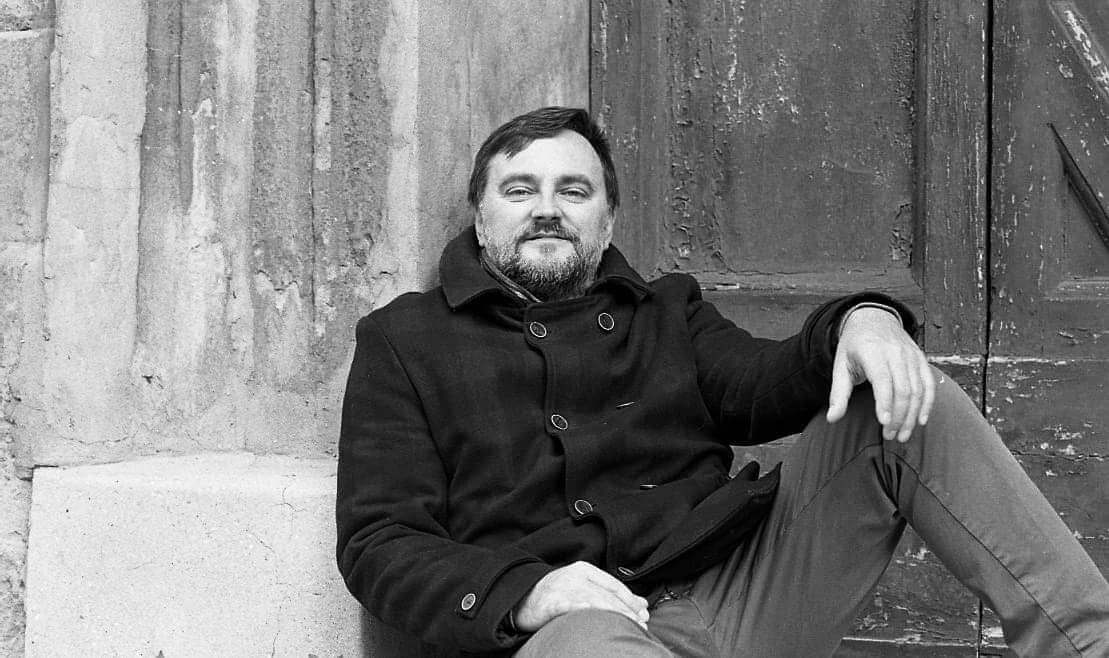
Christian Sinicco © Daniele Ferroni
#2 „The Lakes of Plitvice“ by Vanni Schiavoni (English translation by Graziella Sidoli)
Born in Manduria, Italy, but living in Bologna, Vanni Schiavoni published five poem collections: "Nocte" (1996), "The Suspended Balcony" (1998), "Of Humid and Days" (2004), "Salentitude" (2006), and "Walnut Shell" (2012). He also published two novels "Like Elephants in Indonesia" (2001) and "Mavi" (2019) and edited the poetic anthology "Red - between eroticism and holiness" (2010). Most recently, he also published poetical plaquette „Croatian Notebook“ which features twelve poems dedicated to six Croatian sites: Plitvice Lakes, Kornati, Šibenik, Trogir, Split, and Dubrovnik. Schiavoni wrote the "Croatian Notebook" after a week-long journey in the summer of 2017. His birthplace Manduria is located in the region of Puglia which is 30 miles away from the Pelagosa (Palagruža), the most distant Croatian island, and his surname originates from the name of the Slavonia region in Eastern Croatia.
„For me, it was not just a holiday trip but a journey in and out of everything that I am, a travel diary through which to bring out the game of mirrors between me and that place, between what I am and where I come from and what I have encountered“, said Schiavoni. This journey impacted him with images of the signs of Italy engraved in stone, mournings of the war, communist history („most heretical Communist party in the east in front of the largest Communist Party in the west“, as Schiavoni puts it) and as he added, „the same Adriatic Sea which gives both of us fishes and earthquakes“.
His poem „The Lakes of Plitvice“ is a lovely description of the mixture, the game, and visual eye-candy of the waters in Croatia's oldest National Park, and it linked with a search for bravery and the encouraging point that good and beauty can defeat evil and change it to something better.
THE LAKES OF PLITVICE
The first day they always plunge down into the same spot
the river rapids that come to the encountering
of the white river with the black river
and the more we think ourselves ready with our shrewd eyes
the fewer the adjectives made available to us before that wonder:
the green rush pushes our pupils towards a wild frenzy
it pushes them inside the tearful torrents by our feet
in the shrouded darkness of the sequential caves
and in the vertical caverns sculpted
as if by a hand capable of it all.
Yet Judas must have passed by this place
and though perhaps not the one with burning lips
a simple Judas must have become lost
in this mysterious grid of remorse.
These lakes fall into lakes as lashings on yielding branches
they flow into other waters and so they rain
endlessly
and perfectly untouched.
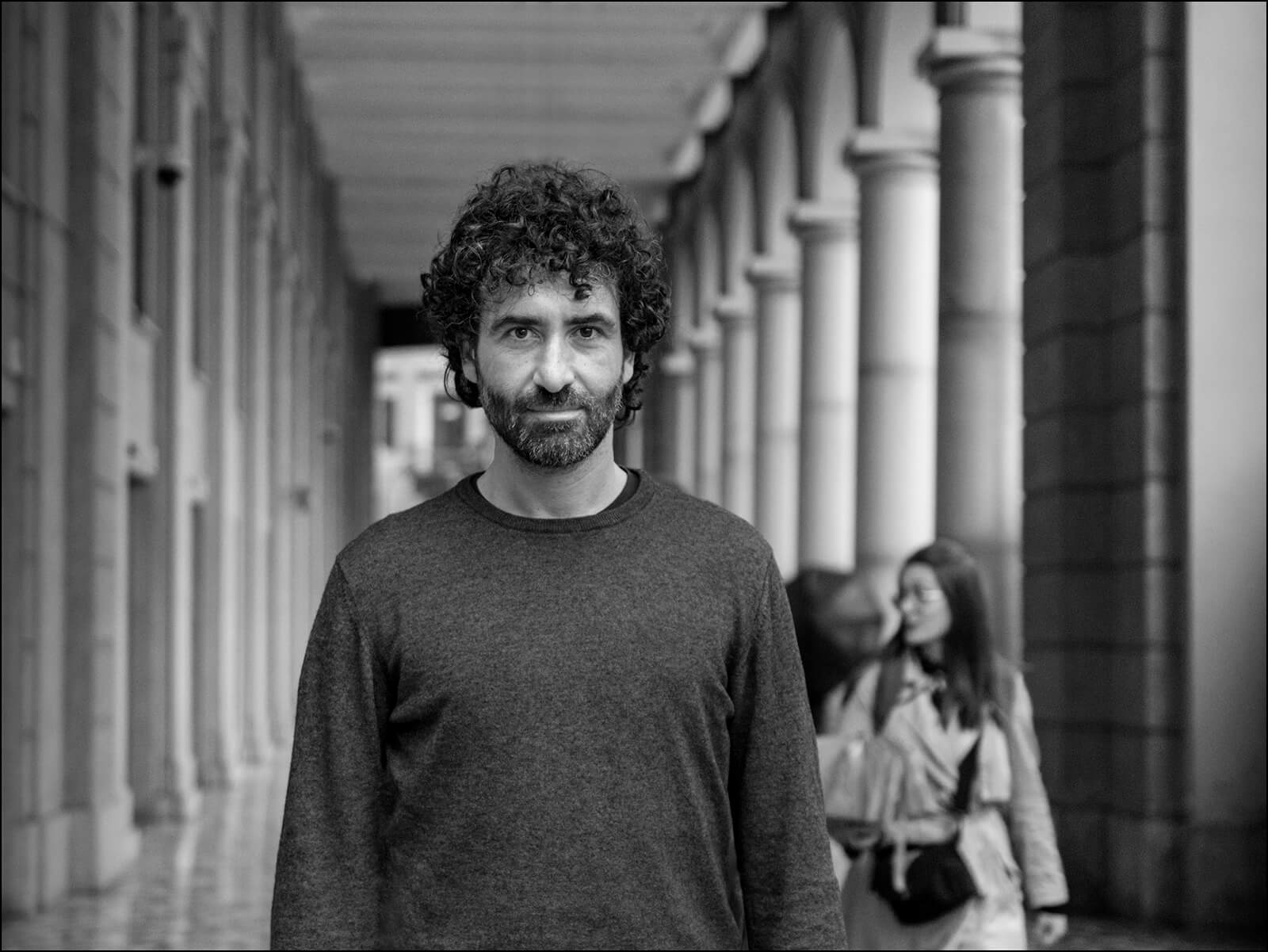
Vanni Schiavoni © Dino Igmani
#1 „Dubrovnik Rock“ by William Vastarella
After Schiavoni and Sinicco, our first-ranked poet is the conclusive evidence there is something so incredible about Croatia it really inspires poetically-inclined neighbors across the Adriatic. Born in Napoli in 1974, William Vastarella is a teacher of Italian Literature, geography, and History. He's has a Ph.D. in semiotics from the University of Bari and writes for several literary and cultural magazines in Italy. He also edited several poetry anthologies as well as semiotic essays. Vastarella visited Croatia several years ago and had a cultural and relaxing holiday on the seaside. „I found her so full of the Mediterranean spirit that I wrote a poem in Italian. I tried to translate it in other words, trying to leave intact the sounds of that memory“, said Vastarella about his poem on Dubrovnik.
The poem „Dubrovnik Rock“ is fantastic in the way, Vastarella visually invokes the images from the history of Dubrovnik (Ragusa) Republic and the relationship it had with Italians at that age with the waves of the Adriatic Sea as the link between Italy and Dubrovnik but also between past and present.
Dubrovnik Rock
Other singers claim to feel
singular vibes in the waves
Nearby this shore,
and so do I.
Ragusa, Dubrovnik
A name is not enough
To trap a soul.
I ask myself
Who’s the other side
Of the other side
As the seawater shuffles.
I touch with my finger
and now I know it’s real
the steel and the wood of the boat
powerful works of man
that wipe out weapons
and I ask no more.
I realize
we have been both
pirates and emperors
centurions and barbarians
through the centuries
each one to the other
a flurry flow
of slavers and Slavs,
slayers and saviors.
Sometimes when the north wind blows,
melting the white in waves,
painting clouds of amazing blues
mirroring the water in the sky,
space seems to become so narrow,
so easy the neighborhood,
then all
the voices of the ancient age
of an ancient game
of thousands lost
in that spot of time,
that spot of sea,
mutate in a mute roar singing
in which merge the rage of riot
and the call for help of a lot
castled in the rock
waiting for a drop of rain to drink
or friend sails on the horizon.
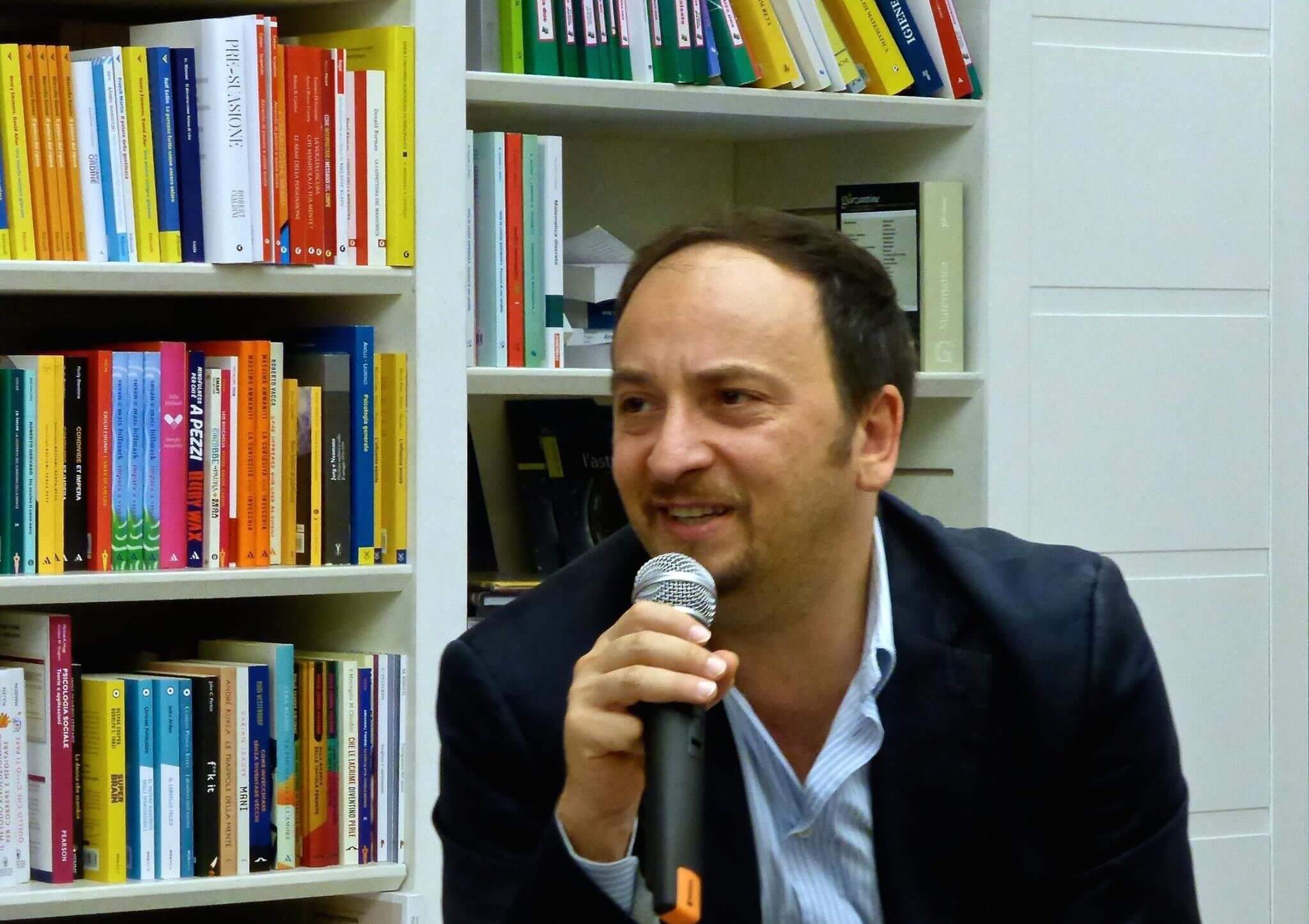
William Vastarella © Vito Signorile
For more about lifestyle in Croatia, follow TCN's dedicated page.
Croatian-American Psychology Professor Mala Matacin on Gender Equality in Croatia
March 8, 2021 - "It's not discrimination, but I noticed that my gender mattered differently in Croatia in terms of marital status and traveling alone," said Croatian-American Psychology Professor Mala Matacin about gender equality in Croatia.
Like every year, 2021 is no different, and March 8 is marked as International Women's Day. The day that celebrates women's emancipation but sadly reminds us that the battle for true equality is still ongoing. Given that massive gatherings still aren't recommended due to the coronavirus pandemic, the annual Noćni Marš (Night March) in Zagreb will not be held this year as confirmed by the feminist collective Faktiv that regularly organizes the event. On the other hand, this year has seen gruesome stories and confessions of sexual abuse, harassment, and even rape all over the Balkans and Croatia too, as is evident by the posts and public outcry gathered by Nisam tražila (I didn't ask for it), an initiative that connects women (as well as male victims of sexual violence) and provides a safe space to share their stories anonymously). What do these recent events tell us about gender equality and does Croatia fall behind on gender equality compared to the US or other Western countries?
Dr. Mala Matacin is a born American. If that sounds odd, it's not just because of the Croatian surname but also because her name is a female gender version of the Croatian noun for „little“ (malo). Her father is from Preko on the island of Ugljan and her grandfather on her mother’s side was from Gromača, a village near Dubrovnik. From September 2019 to March 2020, she was on an academic sabbatical in Croatia where she still has a family and is very enthusiastic about re-visiting post-pandemic. Apart from being on a quest for her family’s roots, she spent her time meeting with academics and students at several universities and learning from activists. One of the highlights of her time here was being able to attend and participate in „Night March“ last International Woman’s Day. When it’s safe to travel, she hopes to bring students to Croatia for a short-term study abroad program.
Matacin has a Ph.D. in Social Psychology with post-doctorate training in Behavioral and Preventive Medicine. She is teaching at the College of Arts and Sciences, the University of Hartford in the state of Connecticut. Her research is focused on women’s health (primarily in the issues of body image and stress), women’s leadership, and the relationship between images and social change. Matacin also has an interest in gender issues and she started and teaches a course „Women, Weight, and Worry” which according to the official Hartford University website is a „popular University honors course“. She also teaches a freshman year course “Beauty, Body Image, and Feminism”. She has designed two new University courses—one focused on systems of oppression and the other focused on photography and activism. Additionally, Dr. Matacin is the founder and faculty advisor for “Women for Change”, a campus organization focused on gender and other equity issues. She has received multiple awards for her work (“Outstanding Teacher Award” in 1999, “Excellence in Service to Students” in 2010 by Sigma Alpha Pi, the National Society for Leadership and Success, “Innovation in Teaching and Learning Award” in 2018, the “Roy E. Larsen Award for Excellence in Teaching and Contributions to University Life” and “Outstanding Faculty Award” in 2019). A 2009 post-graduation survey done by the Career Center named Dr. Matacin one of the three top faculty members in the entire University of Hartford community as a faculty member who had a major/positive impact on students. Just last weekend, during the opening ceremony of the Association for Women in Psychology virtual conference, she received the organization's mentoring award.
I spoke to her about her experiences from Croatia, legal frame, Sex-ED, and what does she overall think about gender equality in the country compared to the US.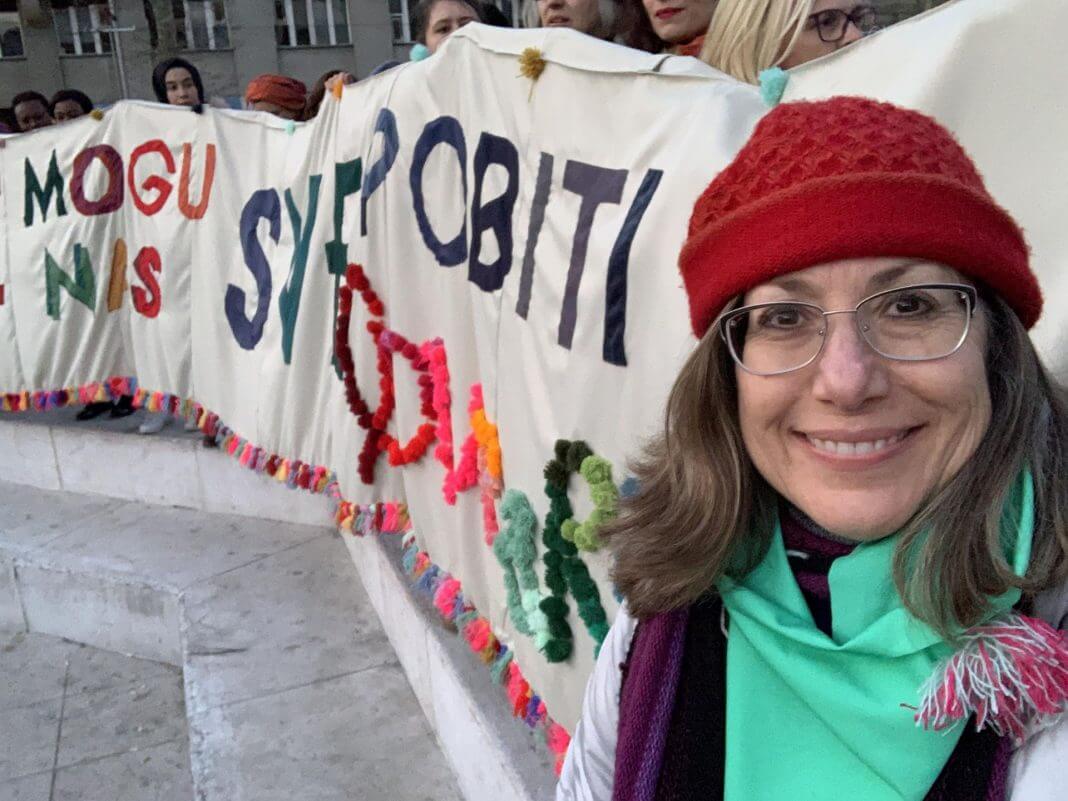
prof. Mala Matacin at Noćni marš (Night March) / private archive
You first came to Croatia in 2020. You participated in the Noćni Marš in 2020 for the International Women's Day in Zagreb. Can you tell us more about how you came about with the organizers, you even hosted workshops for the participants right?
On March 1, 2019, I attended a workshop organized by Faktiv (a feminist collective) and Le Zbor (the first mixed lesbian-feminist choir/band) to learn the “Patrijarhat Siluje" chant and performance. “Patrijarhat Siluje" (Patriarch Rapes) is a translation of the Chilean protest anthem (“Un Violador en Tu Camino”) about rape culture and victim shaming. We learned the chant and choreographed performance to perform during the march (Noćni Marš). At the workshop, I also met several women who were part of Žene ženama, an organization that provides a safe space for women who are refugees/asylum seekers and call Croatia their home. I’m grateful to this organization for generously including me and marching behind their banner on March 8th (Noćni Marš ). In the United States, I participated in similar chants and dances to protest violence against women and girls. So, being in Zagreb for International Women's Day was an extraordinary experience for me. Over 7,000 people took to the streets for Noćni Marš starting from Trg žrtava fašizma. The theme was Živio feminizam! Živio 8 Mart (Long live feminism! Long live March 8th!) and I was honored to stand with my Croatian sisters and meet new friends and colleagues at the protest.
What do you think about Croatian gender equality activists? From what you had the chance to see, are they doing a good enough job in advocating solutions to these problems, or is there something they still have to learn from their colleagues in the US or other western countries?
I spent most of my time connecting with scholars doing academic work on issues related to gender and didn't meet activist groups until March. My unexpected return to the United States that month due to the coronavirus did not leave me with as much time to interact as I wanted to. What I did experience was quite similar to those I'm familiar with—intelligent, good community organizing, active in their efforts to address gender and other social inequities, warm and generous (as evidenced by their willingness to accept me into their midst), and finding creative ways to get their message across. Activism is most commonly associated with public protest and marches, but artists can use their medium (for example, poetry, photography, performance, music) to challenge systemic injustices, and I was able to see and meet several artists in Croatia who were doing that.
Were you informed about gender equality problems in Croatia before coming to the country or was meeting up with activists in Croatia an eye-opener for you? Was there something about them that surprised or shocked you that you didn't expect to hear?
I was on my academic sabbatical in Croatia from September 2019 – March 2020. In preparation for coming to Croatia, I tried to read as much as I could about the state of affairs for women and the LGBTQ+ community and the country's efforts to address gender inequalities. For example, I found out about the Ombudswoman's Office for Gender Equality and was lucky to meet with two representatives in the office in February 2020, I spent the first three months of my time in Croatia in Dubrovnik and the last four months in Zagreb. This is important because I found a difference between these two parts of the country. Dubrovnik is more conservative and it wasn't until I got to Zagreb that I found people doing activist work. Also, although I am American-born, I am Croatian on both parents' sides. As such, I'm familiar with the patriarchal Croatian family dynamics; in fact, it's one of the reasons I'm so interested in gender issues because it's personal.
It's such a great question about anything that surprised or shocked me. I probably could write an entire article on the things that were surprising (and I should!), but as for shocking—there is one—the #MeToo movement not gaining traction in Croatia. In the United States, the movement exploded in 2017 and was very much part of the country's narrative but I found it surprisingly absent in Croatia. Instead, I learned about the #spasime movement which is centered around domestic violence (very much focused on the family unit). Thanks to you, I have also been made aware of „Nisam tražila“ which some are arguing is the Balkans #MeToo movement. What is striking to me is the similarity in the way both #MeToo and „Nisam tražila“ gained „sudden“ attention and visibility—both were popularized by actresses within their respective countries. In this way, there is value to those who can use their privilege to bring attention and visibility to social injustices that grass-roots activists spend most of their lives addressing.
You are born in the US but aware and proud of your Croatian roots. The Croatian diaspora is big and quite well-formed in the US. Are you associated with other Croats in the US and how does the diaspora feel and think (if it even follows) the gender inequality in the country? The liberal stream in Croatia often looks negatively on the diaspora as they see them as conservative, uninformed, or indifferent about the actual problems in Croatia despite having and exercising voting rights on Croatian elections. Do you vote as well?
Unfortunately, I have never lived in a part of the U.S. where there has been a strong, well-connected Croatian community. Much to the dismay of extended family who did grow up within the Croatian diaspora, my siblings and I do not speak Croatian and are overall less immersed in Croatian culture. But, I think this has had its benefits too. As you suggest, my experience with the Croatian diaspora in the United States is more conservative and indifferent to problems in Croatia, particularly as it relates to women. There is a phrase I learned when I was in Croatia—tako je—which seems to be spoken when one has given up on trying to solve an issue or there is simply an acceptance for „what is“. Had I grown up fully absorbed in the Croatian community in the U.S., I might be more accepting of „what is“ when it comes to fighting injustice. Ironically, my being steeped in a deeply Catholic family as a child instilled this sense of fighting for marginalized groups. I went to college at a Jesuit University and the Jesuits are well-known in the Catholic tradition as being socially progressive. I guess you can say that my feminist awakening happened within the context of a Catholic institution that taught me to challenge ideas and commit to social justice.
I absolutely vote here in the U.S. but have no voting rights in Croatia as I'm not a citizen. I was actually in the midst of getting my Croatian citizenship when I had to leave Zagreb last March. I'm still really sad that I could not complete the final steps when I was there.
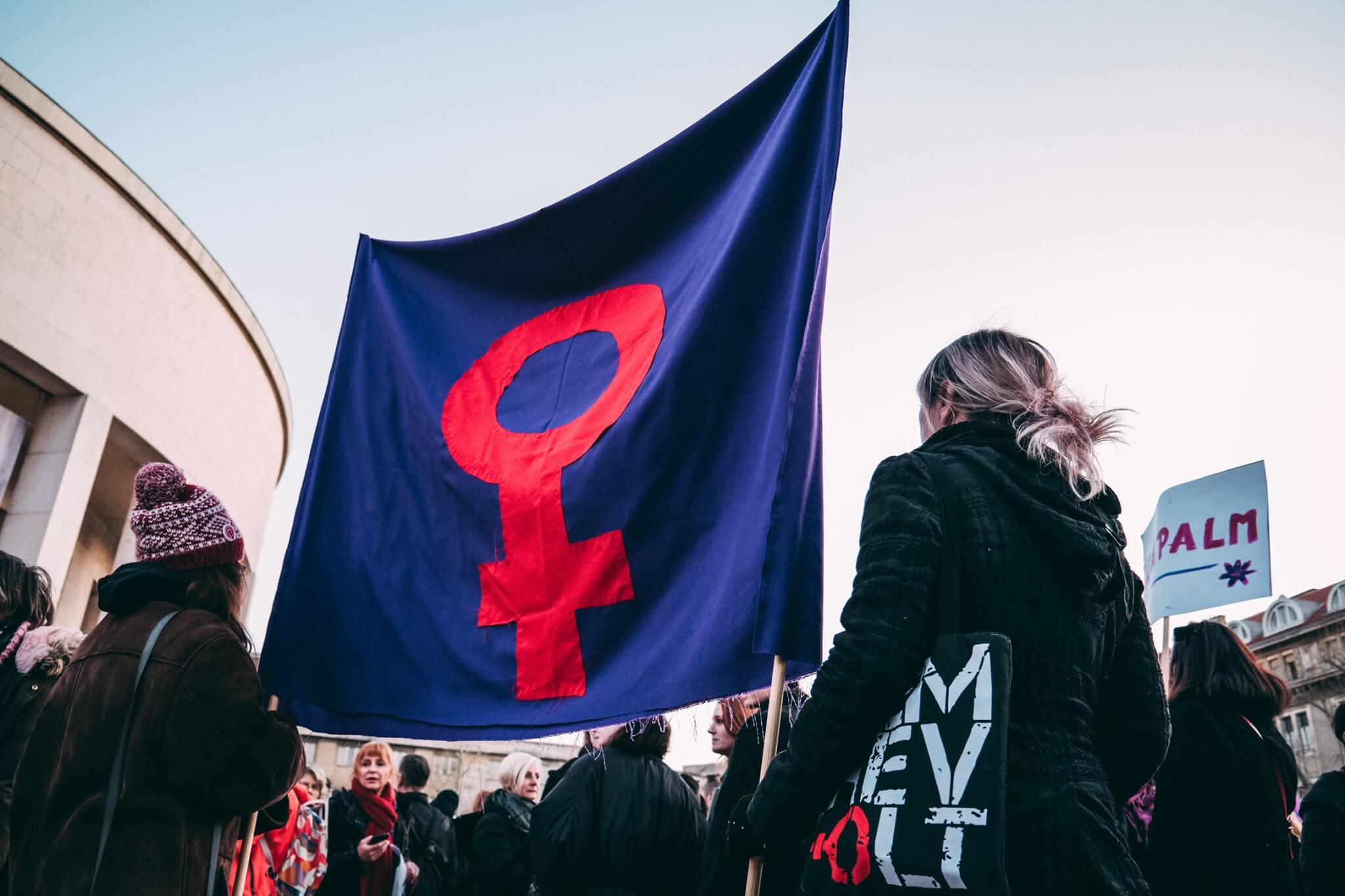
Noćni marš (Night March) 2020 © Lara Varat
A similar-to-me too-movement came about in Croatia and the Balkan region known as „Nisam tražila“ (I didn't ask for it) in 2021. Since Serbian actress, Milena Radulović, publicly accused her acting professor Miroslav Mika Alekšić of raping and abusing, similar accusations spawned on the acting academia in Zagreb and other faculties on the University of Zagreb and many more confessions from everyday people (mostly female but also male) experiences with sexual harassment, collecting 40,000 confessions in the first week from all over Serbia, Croatia, and Bosnia, and Herzegovina) on the „Nisam tražila“ Facebook page. Are you following this situation and what do you think about it?
Thanks to your question, I'm now definitely following it and trying to read as much as I can. As I noted in the question you asked me earlier about things I was surprised or shocked by, it was about how the #MeToo movement had not really taken off in Croatia as it did in the United States. I'm glad to see that there is visibility and acknowledgment of the sexual violence, abuse, and harassment of women in the Balkans. Sexual violence perpetrated by men in power needs to be seen and stopped.
What do these confessions both in the US and Croatia say about the acting community? What caused so much sexual blackmail in this particular field?
I don't think that the truths of sexual violence say anything about the acting community—what it does say is that those who have a public platform to acknowledge such abuse create visibility that those who are „ordinary citizens“ do not. People like Milena Radulović from Serbia and Alyssa Milano from the United States only magnify and make public the work of activists and community organizers. I don't know enough about activists in Serbia, but in the United States, it was activist Tarana Burke who first used the term „me too“ in 2006 and started the movement. #MeToo only went „viral“ in 2017 because of celebrity actions on social media. I feel it's very important to highlight the often invisible work of such activists. Blackmail only happens because the person in power knows they did something wrong and doesn't want the public to know about it because it might damage their reputation. Only those with enough influence, power, and money are privileged to use blackmail and one of those sectors is the acting community.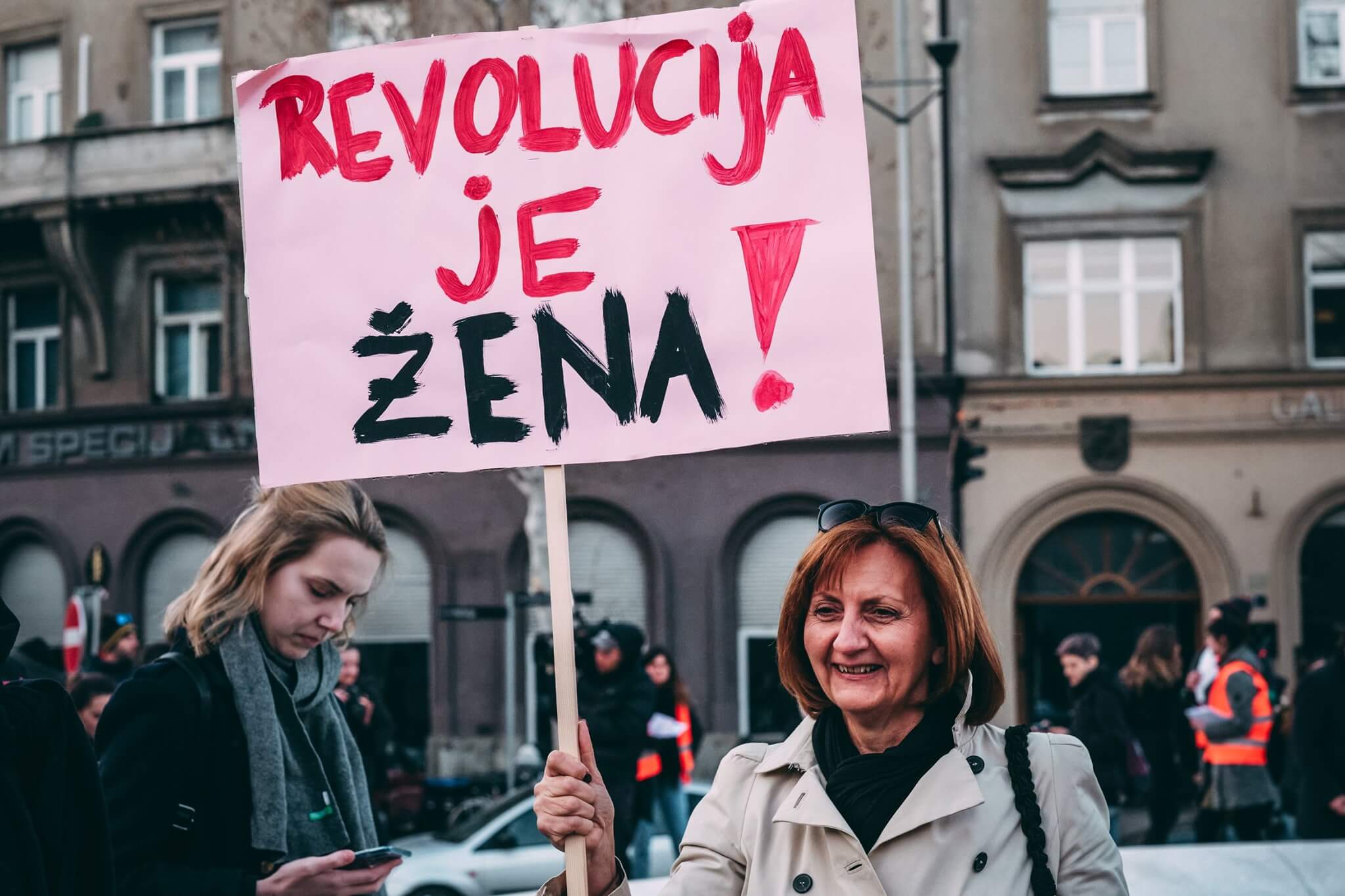
"Revolution is a woman", Noćni marš (Night March) 2020 © Lara Varat
„Laws are necessary but not sufficient“
Višnja Ljubičić, the Ombudswoman for gender equality demands changes in the law. As current law in Croatia allows legal prosecution up to three months since the event of sexual harassment occurred, Ljubičić asks for the law to increase for up to ten years. The law also states that sexual harassment is investigated only if the victim reports it and not ex officio, like for other sex crimes, which Ljubičić says also needs to change. How would you compare the current law in Croatia and Ljubičić's proposal to the law in the US? Is it stricter than Croatian and what changes did it go through throughout history?
I'm not a legal scholar and honestly, I find it quite confusing due to legal jargon and federal vs. state law. Federal law states that a person can have 180 days to report sex discrimination (sexual harassment is one type) in companies with more than 15 employees. In small workplaces (under 15 people), workers have no formal legal protection. Only seven states extend the time limit to more than 300 days. Finally, five states do not even have an office that enforces anti-discrimination cases. Others can report the sexual harassment for someone else, but there is no anonymity for the victim as the case must be investigated. Current time limits are similar between the countries. I am not familiar with the details of either country's laws (to say which is stricter), but what I can tell you is that visibility matters. As outlined in this article in Time magazine, the term „sexual harassment“ was not coined until 1975. But, the case that really made sexual harassment visible in the U.S. was Dr. Anita Hill's testimony against Supreme Court Nominee Clarence Thomas. As stated in the article: „Though Thomas denied the allegations and was eventually confirmed to the Supreme Court, Hill’s decision had immediate consequences: in its wake, sexual-harassment complaints filed with the Equal Employment Opportunity Commission doubled, and payouts from court settlements increased as well.“ However, it's important to note that when there is progress, there is also backlash.
Maja Mamula, a psychologist, and coordinator for „Ženska soba“ (Women's room), a non-profit organization for the prevention of sexual violence, suggests that due to the long period of the judicial process, institutions in which the accused is working should sanction and isolate themselves from the perpetrating suspect before the judges' ruling. She added that despite the „presumption of innocence until proved otherwise“ this is the minimum institutions should do even before the verdict. How would you comment on this proposition and how do people feel about this in the US as well? In your view, is there any possibility to ensure justice for the victim but also respecting the presumption of innocence? Should courts just be quicker or is there a more in-depth issue at stake?
„Is there a more in-depth issue at stake?“ is what's important from my perspective. It's highly problematic that we allow contact between individuals when a person's life is at stake due to violence. One should not have to request a restraining order (another legal step) to ask that an abuser not come near the victim. Legal protections only deal with laws and not the ethical or systemic inequities built into the system. For example, the legal system benefits those who have money, can access the internet, are English-speaking (in the U.S.), citizens, White, male, cisgender, etc.
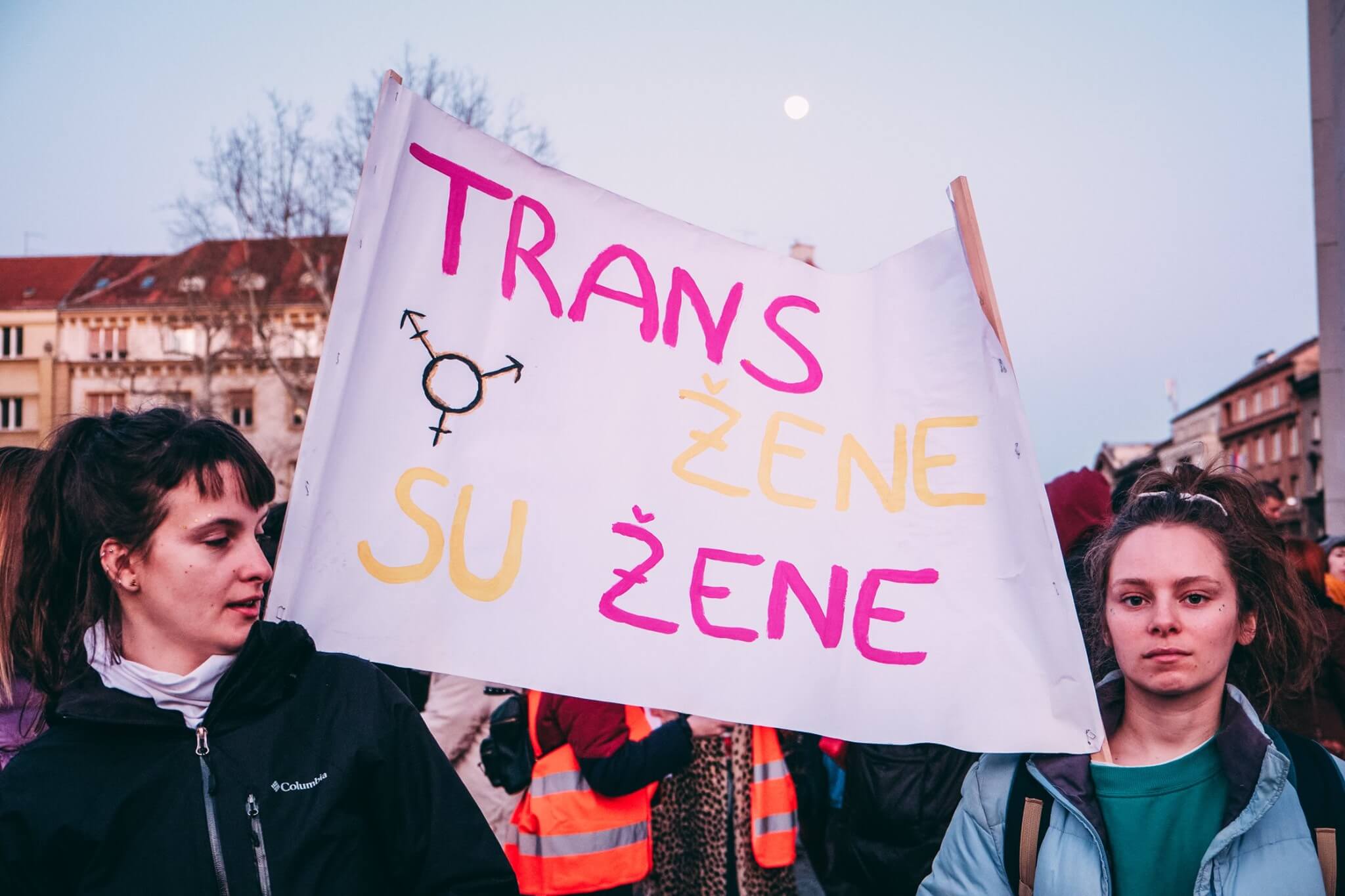
"Trans women are women", Noćni marš (Night March) 2020 © Lara Varat
Mamula also warns that the Council of Europe suggests that for 200,000 residents there should be one center for the prevention of sexual violence, but the Croatian government ignored the proposition to establish three new centres. What is the situation with such centers in the US, are they sufficient enough and if so, do they help society in supporting the victims and encouraging more reports of sexual violence?
The U.S. federal government has an Office on Violence Against Women that is part of the Department of Justice. The office does not provide direct aid or support to citizens but rather administers a grant program „designed to develop the nation's capacity to reduce domestic violence, dating violence, sexual assault, and stalking by strengthening services to victims and holding offenders accountable“. It's important to note that this office was created in 1995 after the Violence Against Women Act (VAWA) was enacted. Congress must reauthorize VAWA every five years and this has been done until 2019 when bipartisan support could not be obtained. Extending protections to vulnerable groups since 1994 has included indigenous populations, transgender individuals, and victims of human trafficking. VAWA does not currently protect girls at risk for female genital mutilation (FGM), immigrant populations, forced child marriage, or honor killings. To the best of my understanding, the lack of this Act not being reauthorized does not remove legal improvements made since 1994, but limits grant opportunities. Federal laws make a difference in reducing violence but there is no doubt the effects vary by state due to local regulations. In addition, there is little federal oversight in evaluating the effectiveness of grants provided to various organizations.
Whether these laws are sufficient is a good question. I do not believe they are. Laws are necessary but not sufficient. Laws do not necessarily address ethical issues or structural barriers that prevent equal access to protection. Justice cannot be accessed in marginalized groups that do not have financial or linguistic resources. They may also fear the legal system or simply have no idea how to access help. Even in trying to respond to your question, I had to do a lot of reading, searching, and understanding my own country's complicated laws—imagine being poor, an immigrant, or a member of a gender-minority group and trying to cope with the trauma of violence. Laws do nothing to mitigate unequal access.
Even when a woman has access and her case goes to court, her word is subject to victim-blaming—essentially an argument that she is personally responsible for her own victimhood (e.g., rape). Victim blaming is an example of something called the „fundamental attribution error“ (or correspondence bias) which is our tendency to blame individuals rather than the circumstances or situation. There are countless examples of citizens protesting victim-blaming in rape trials globally but it is still a tactic used in court to discredit a victim's story. Victim-blaming shifts responsibility away from the perpetrator. Activists and scholars say we are asking the wrong questions when it comes to sexual assault. The focus needs to shift from the victim to the abuser. For example, in the case of domestic violence, instead of asking „why does she stay?“, we should be asking „why does he hit her?“ In conjunction with laws to protect victims and hold perpetrators accountable, we absolutely must be addressing such biases and tactics within the legal system.
Another suggestion regarding the prevention of sexual harassment that is seeing bigger and bigger support in Croatia is introducing sex-ed in Croatian schools. This is something that ranges widely in the US as well. According to the Planned Parenthood website, there is a huge public support for Sex-Ed but „currently, 24 states and the District of Columbia mandate sex education and 34 states mandate HIV education“. What are and what do you think about CDC sexual components (are they sufficient or not) and do these 24 states and the district of Columbia record fewer numbers of sexual harassment and sex crimes than the US average due to sex-ed?
I'm glad to hear that sex education is gaining support in Croatia! Sex education varies widely by state. There have been changes since 2014 and they are critical to understanding what can and cannot be taught. Sex education in the U.S. is up to individual states to administer. If states want to get federally funding for programs, they can only teach „abstinence-only-until-marriage“ (AOUM) or „Sexual risk avoidance“ (SRA) programs (the name has changed over time). Essentially, these programs must adhere to eight strict guidelines requiring instructors to teach only about abstaining from sex unless one is married. They also teach that having sex outside of marriage is psychologically and physically harmful—this is not true. Abstinence-only programs don't work. In a study published in 2019 in the American Journal of Public Health, the authors show that abstinence-only sex education does not have an effect on teenage pregnancy; in fact, in conservative states, such programs have the opposite effect showing an increase in teenage pregnancy. In 2010, two small sources of federal funding were initiated that promoted sex education programs supported by evidence-based science (contraception, abstinence, sexually transmitted infections, and healthy relationships). These programs do work by lessening teenage pregnancies. Federally funded sex education is contentious and vacillates between support for programs reflecting religious values of abstinence-only and science-based interventions reflecting public health, particularly adolescent sexual health. Fortunately, there are other non-federally funded organizations like Planned Parenthood, the largest provider of sex education in the U.S. Their programs include topics like „communication skills, decision making, birth control, STIs, healthy relationships, consent, body image, anatomy, and puberty“.
In an editorial in the Journal of Youth Adolescence, the authors examine research from social and behavioral sciences in an effort to address more holistic sex education. They suggest that comprehensive sex education must also address gender and other structural inequalities. For example, the Centers for Disease Control (CDC) notes that risk factors for serious health outcomes are related to sexual behaviors and violence in LGBTQ+ adolescents more than their peers. As Croatian leaders and educators begin to think about sex education, I would urge them to base programs on „scientific input from a broad range of disciplines, including social, behavioral, medical, and public health sciences“ as these authors suggest.
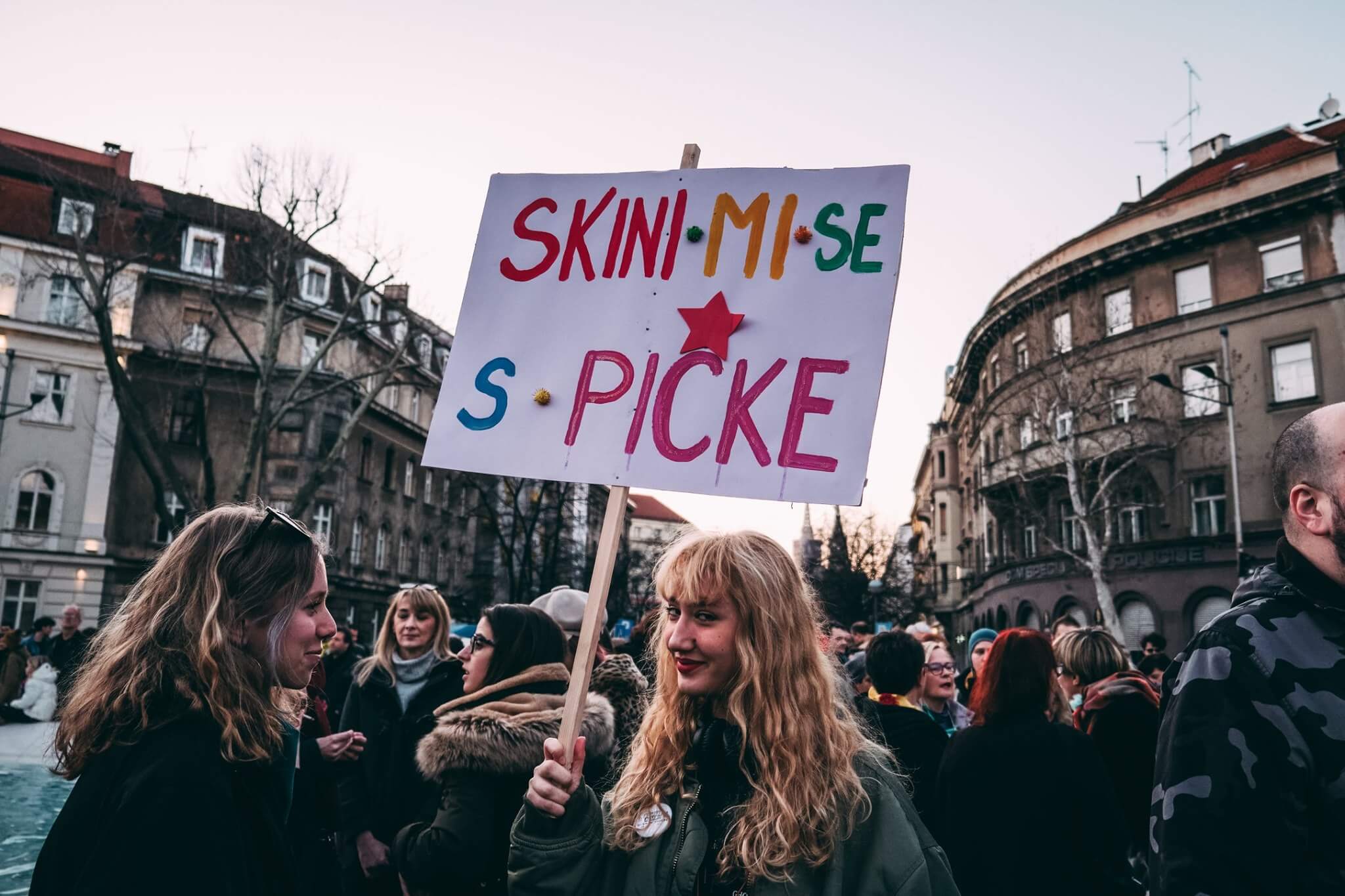
"Get off my pussy" Noćni marš (Night March) 2020 © Lara Varat
„Here in the U.S. is not much different“
Last year there was a quite gruesome verdict that caused quite a big controversy in Croatian public space. In the town of Čakovec in 2000, three 16-year-old boys were drinking in the afternoon in the bar in the company of a 16-year-old girl. After drinking they went to the family house of one of the boys and they raped her. The girl reported the crime after a week to the doctors who alerted the parents and the trial to the three boys began. The trial lasted for about 20 years. The girl has difficulties walking due to having cerebral paralysis as a child and the prosecutors charged the three boys for „forced multiple sexual intercourse with a person who is incapable of defense“. The experts, however, determined that the victim resisted the crime both verbally and psychically making the attackers clear that she didn't want to have intercourse. She was crying and pushing attackers away“. Due to the fact that the girl resisted and the charge was that it was a forced multiple sexual intercourse with a person who is incapable of defense, the three attackers were ruled as not guilty and clear of all charges. Additionally, the Ombudswoman for gender equality Višnja Ljubičić warned in Croatian media following the „Nisam tražila“ initiative, there are only a couple of guilty verdicts for perpetrators of sex crimes annually, and instead, these verdicts often go in favor of the perpetrators. What is the situation in the US? Does it also take such a long time for the court to give a verdict for sex crimes trials are prosecutors also making such mistakes, and does the US have any sort of a legal mechanism that prioritizes sex crime trials?
The case you describe in Čakovec is appalling but I'm afraid that the situation here in the U.S. is not much different—there are equally horrifying stories here. As you might imagine, the question of time for sex trials and judgments in favor of perpetrators is quite complex. However, I will share some findings outlined in this 222-page report. The authors note that attrition rates for sexual violence in the criminal justice system are substantial and „most victims never receive closure.“ It is already well-established that most cases are never reported. Those that are reported rarely end in arrest and even fewer go to a trial 1.6%. These data are corroborated by the Rape, Abuse & Incest National Network (RAINN). They report that perpetrators of sexual assault are the least likely to go to jail than all other types of crimes.
Sexual assault is based on control and power. Our governments, educational, legal, and other social systems need to acknowledge and address the sexist, racist, classist, ableist, homophobic, and other forms of discrimination inherent in them. Otherwise, laws will simply continue to exist on inequitable systems and perpetuate discrimination.
But overall, are these problems bigger in Croatia than in the US or other western countries? The maximum sentence in Croatia is 10 years for rape and up to two years for sexual harassment while the highest legal prison sentence in Croatia can be 40 years. Is this sufficient? What would be, in your opinion, the most sufficient prison time for these crimes?
Our focus on punishment keeps us locked in a system that perpetuates harm and does not allow for the possibility of structural change. Do I think that perpetrators should be held accountable for their actions? Yes, I do. However, prison does not necessarily deter people from committing crimes and recidivism is a problem. Instead, the focus should be on prison reform, restorative justice, and the prison industrial complex (PIC) that uses policing and imprisonment for social and economic problems. 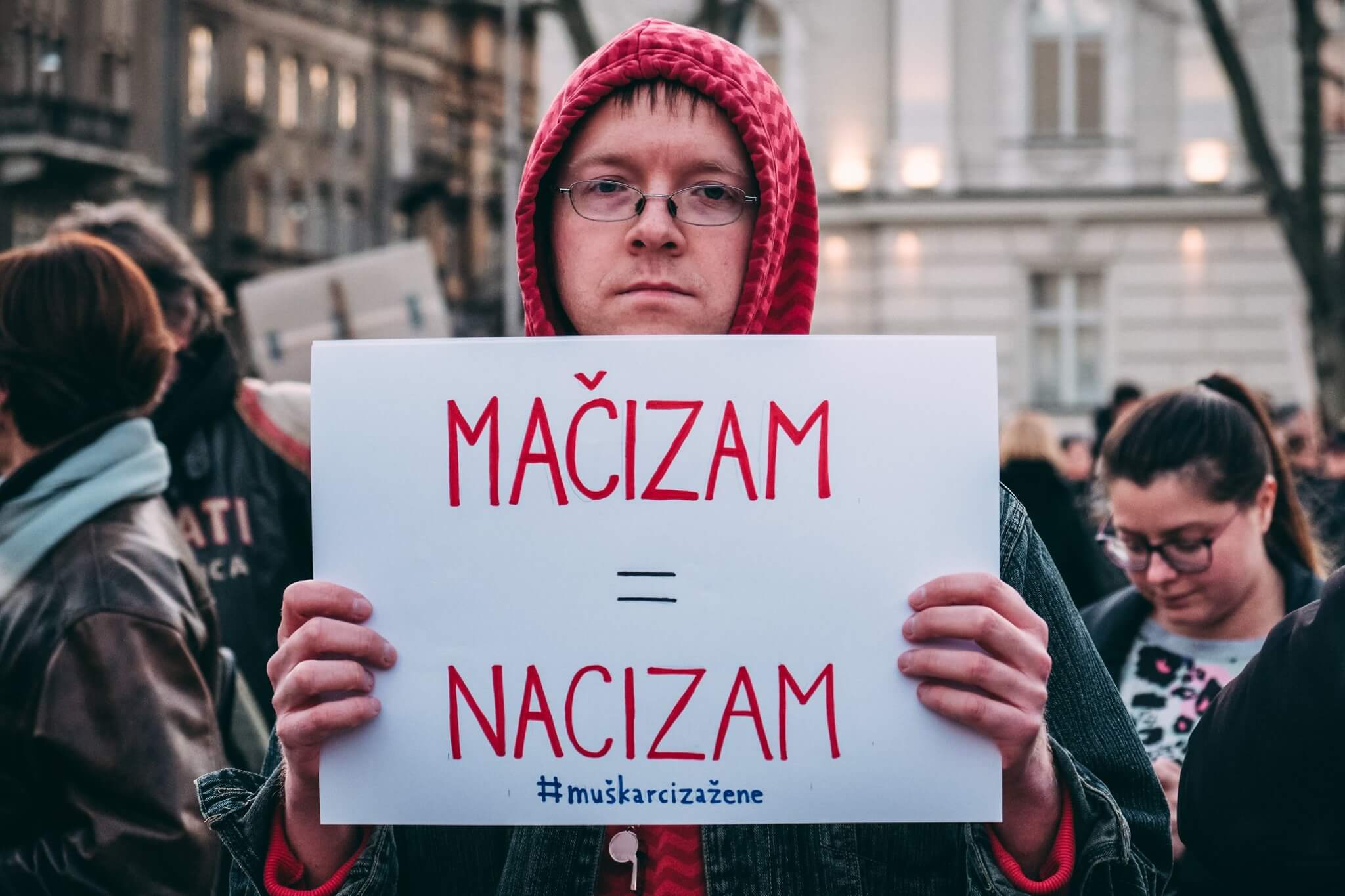
"Machoism = nacism #maleforwomen" Noćni marš (Night March) 2020 © Lara Varat
Equality vs tradition & faith
The majority of Croatians are proud of their traditional way of life and this tradition does play a huge role in the tourist promotion of Croatia that attracts visitors. But these traditions do come with a patriarchal structure and gender inequality as with other negativities that make the liberal stream roll-their eyes or down-right enrage them. Is it possible for Croatia to keep the traditions, its charm and yet create a society that does not discriminate on any level, including gender, religion, etc?
It's absolutely correct that certain traditions come with gender inequalities within a patriarchal system and Croatia is not alone in this. It reminds me of an essay („Chiefing in Cherokee“ reprinted in The Best American Travel Writing, 2017) by Stephanie Elizondo Griest I read prior to coming to Croatia for my sabbatical. She addresses this question of capitalizing on culture versus wondering if one's „touristic experience was authentic or not“. Tourists want „authenticity“ (tradition), but does it simply perpetuate discrimination based on harmful gender and other stereotypes? After all, tourism brings in money. I would like to answer this question based on one of many experiences I had in Croatia which I wrote about in my blog. I was grateful to be introduced to a tour guide who not only knows the history of Dubrovnik and Croatian tradition but can personalize her tours to include her knowledge of historically marginalized groups (the Jewish community, women, orphans, etc.) and how those forms of discrimination currently manifest themselves. I am not alone in wanting to be exposed to Croatia's charm but also how its complex history mingles with current forms of discrimination. I think that creating a society that does not discriminate is possible and acknowledging past injustices is part of that process.
You mention your Croatian roots and the catholic origin and how you even studied in a Jesuit school that is quite progressive. The biggest opposers to Sex-Ed in Croatia are conservative Catholic politicians and thinkers and some of them, without much success, are fighting for prohibiting the right to abortion in the country as well as limiting LGBTQ rights. Jesuits are not too popular in Croatia but what would you suggest, from a catholic position to the Croatian Catholics how to reconcile their faith with sexual education, LGBTQ rights, and women's reproductive rights?
When I was a child, I distinctly remember a lesson from catechism about baptism and limbo. I learned that if a baby were to die before being baptized, they could not go to heaven (baptism being a prerequisite after all). This bothered me...immensely. I questioned the doctrine—„do you mean that if a person in another country who isn't Catholic and has never even heard of baptism can't go to heaven even if they have been a good person?“ The answer, a firm „no“, made no sense and I was admonished for asking more questions. Of course, the Catholic church got rid of the notion of limbo some time ago, but the hypocrisies of my childhood religion were not lost on me. Although I did not have the language at the time, I was asking questions about privilege and the very foundations of systemic injustice. These answers weighed heavily on me as a child as I gravitated to the lessons of love and forgiveness.
I share this story because grappling with any belief structure, including one's religion, has been part of who I am. Reconciling one's faith with injustice is a personal journey and for me, doing the moral and right thing did not coincide with some tenents of the Catholic faith. I was not really allowed to question doctrine until I entered college and was exposed to Jesuit education that is rooted in service, justice, and love. I was taught to critically think about rather than accept doctrine. I write a bit about this in my blog in trying to understand Catholicism with the general lack of volunteering in Croatia.
The truth is there are conservative and progressive ideas that inhabit all social institutions—family, government, and religion. There is a Roman Catholic axiom, Imitatio Christi, which is loosely translated to a popular phrase that came into English usage in the 1990s, „What Would Jesus Do?“. If your answer to this question urges you to act with humility and compassion then perhaps there is room in Catholicism for inclusion and education (including sex education) based on teaching healthy relationships and nonviolence.
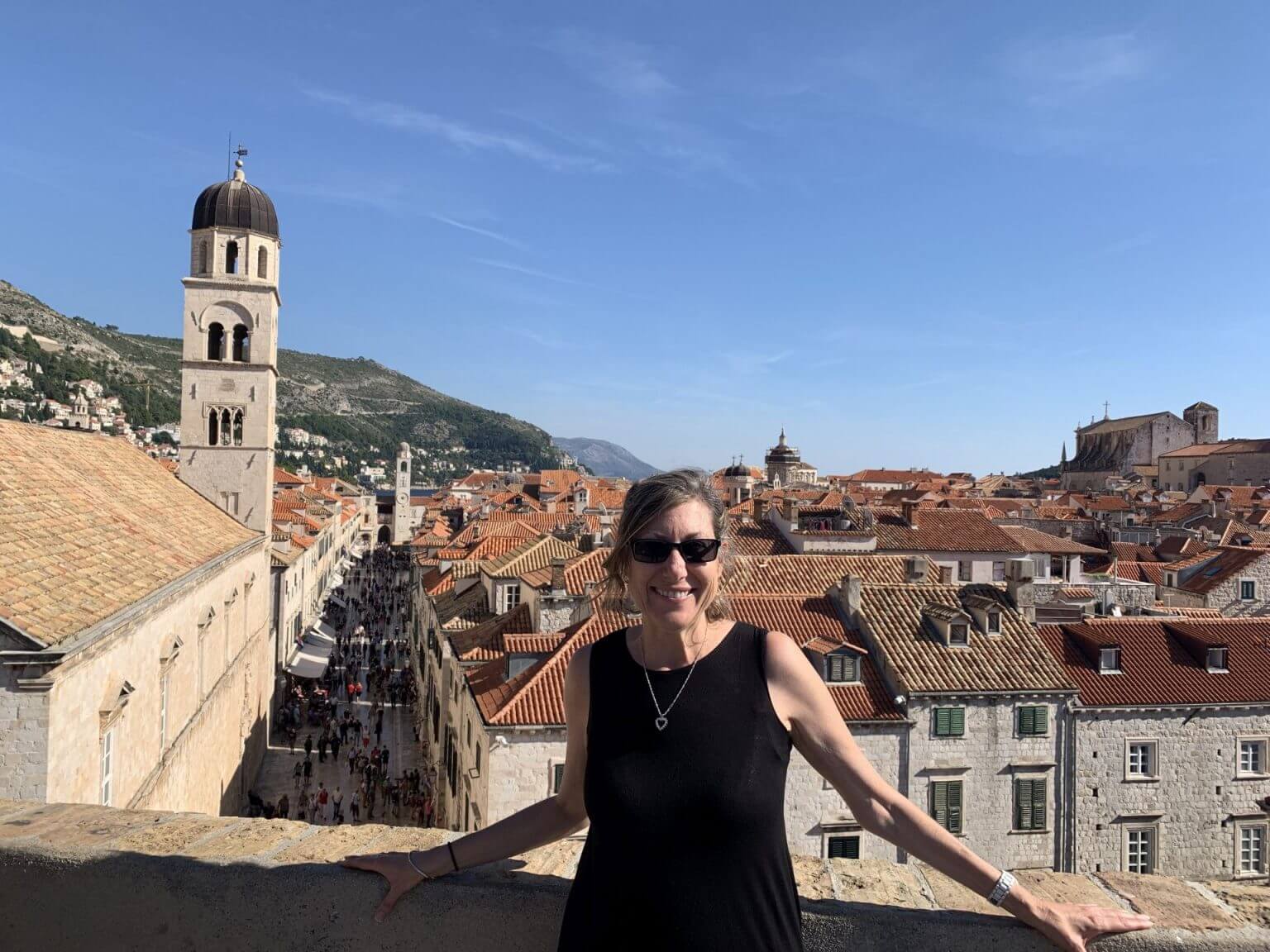
prof. Mala Matacin in Dubrovnik / private archive
To conclude, as someone coming from the US in the middle of getting Croatian citizenship, do you feel you will be more discriminated against in Croatia for your gender than in the US? Given your participation in "Noćni marš" and your knowledge do you think that as a Croatian citizen you could help improve the gender equality in the country both with your knowledge but also with experiences and background from the US?
It is my sincere hope that I will be able to get my Croatian citizenship! I met many people during my sabbatical who are doing important work to improve gender equality in Croatia and I would be honored if I could contribute to the ongoing efforts. I did not feel discriminated against based on my gender in professional realms in Croatia. In fact, a great majority of those doing gender-related work are women and I felt a kinship with them just as I do with those in the U.S. However, I know that women are discriminated against despite that it is not as overt as it once was (e.g., a woman not being given a job because of her sex). Research on implicit bias supports this.
Project Implicit is a non-profit organization founded by Harvard University in 1998. Implicit biases are deeply held attitudes and stereotypes about certain groups of people. „People can act on the basis of prejudice and stereotypes without intending to do so“. Despite the gains women have made globally, social science research supports that implicit biases are related to discrimination in complex ways. For example, a recent study showed that men are more likely to be seen as „brilliant“ than women across 79 countries globally. One of the authors states that "stereotypes that portray brilliance as a male trait are likely to hold women back across a wide range of prestigious careers".
It's not discrimination, but I noticed that my gender mattered differently in Croatia in terms of marital status and traveling alone. Initially, I was taken aback by questions about my marital status (for example, „where is your husband?“) or why I was in the country by myself. Such questions are not normally asked of me in the U.S., particularly among people who I meet in casual, public spaces. Yet, in Croatia they seemed natural and okay to ask—it felt unsettling to me.
For more about politics in Croatia, follow TCN's dedicated page.
Croatia Scores Better Than USA On Global Freedom Rankings - Večernji List Daily
ZAGREB, 4 March, 2021 - Croatia ranks better than the USA, according to the criteria applied by Freedom House to measure global freedom, the Večernji List daily reported on Thursday.
Croatia's total score of 85 points places it in the category of free countries, and the total score of the USA is 83, according to the latest annual Freedom in the World report, in which Freedom House, a non-governmental organisation, rates people’s access to political rights and civil liberties in 210 countries and territories.
In the section Political Rights, Croatia's score is 36 out of the total 40 and in Civil Liberties it scores 49 points out of maximum 60 points.
The three Scandinavian countries -- Finland, Norway and Sweden -- top the ranking with the maximum 100 score.
Freedom House describes Croatia as "a parliamentary republic that regularly holds free elections. Civil and political rights are generally respected, though corruption in the public sector is a serious issue."
Concerning the European Union, of the 27 member states, Croatia fares better than Bulgaria, Romania, Poland and Hungary, while it fares worse than the remaining members according to assessments made by this nongovernmental organisation.
As for the global developments in 2020, the NGO says that "as a lethal pandemic, economic and physical insecurity, and violent conflict ravaged the world, democracy’s defenders sustained heavy new losses in their struggle against authoritarian foes, shifting the international balance in favor of tyranny."
Freedom House says in its latest report that "the countries experiencing deterioration outnumbered those with improvements by the largest margin recorded since the negative trend began in 2006. The long democratic recession is deepening."
"The impact of the long-term democratic decline has become increasingly global in nature, broad enough to be felt by those living under the cruelest dictatorships, as well as by citizens of long-standing democracies," it added.
U.S.Confirms Anti-dumping Duties on Aluminium Imports, Croatia Included
ZAGREB, 3 March, 2021 - The U.S. Commerce Department on Tuesday issued final anti-dumping duties on common alloy aluminium sheet from 18 countries investigated, including Croatia, Reuters reported.
The anti-dumping case and a companion anti-subsidy countervailing duty case were initiated under the Trump administration in March 2020 and in October it introduced preliminary duties on imports from 18 countries.
The group includes Germany, Italy, Spain, Croatia, Slovenia, Serbia, Romania, Greece, Turkey, India, South Korea, Taiwan, Indonesia, Egypt, Oman, South Africa, and Bahrain.
The U.S. Commerce Department on Tuesday confirmed the introduction of duty rates.
Germany had the highest anti-dumping rate, ranging from 49.4% to 242.8%, and it has now been slightly lowered compared to October. In the 18-country group Germany is the largest exporter of aluminium sheet to the United States, with $286.6 million worth in 2019.
Bahrain, second with $241.2 million worth of aluminium sheet exported to the United States, received a 4.83% anti-dumping duty rate and an anti-subsidy rate of up to 6.44%.
The rate for aluminium imports from Croatia will be 3.19%, a mild correction compared to the preliminary decision of October 2020, under which the rate was 3.22%.
Aluminium imports from Turkey will be taxed with the lowest duty rate, of 2.02%.
The duties will come on top of 10% U.S. tariffs imposed on most aluminium imports by the Trump administration under a national security law.
The duties were announced just hours after Rhode Island Governor Gina Raimondo won confirmation as the new U.S. Commerce Secretary in an 84-15 U.S. Senate vote.
US Embassy Croatia Officially Confirms Croatians USA Visa-Free Travel
February 16, 2021 – It's official! The American Embassy in Croatia today formally confirmed Croatians USA Visa-free travel. Croatians will have the right to travel to the USA without a Visa from later this year.
The American Embassy in Croatia today officially confirmed Croatians USA Visa-free travel. Having met the final stipulation set by the USA in 2020, Croatians right to travel to the USA without a Visa will be open later this year.
Tweeting from the official account of the American Embassy in Croatia, the news of Croatians USA Visa-free travel was released at 16.49 on Tuesday 16 February 2021. This is the first time that official confirmation of Croatians USA Visa-free travel has come from America authorities.
The main precondition set by the USA for the abolition of visa requirement for Croatians visiting America was a drop in the number of denied Visa applications to below 3%. Croatia attained that result back in September 2020. Total Croatia News was the first English language media in the world to reveal the stipulation had been met, granting Croatians USA Visa-free travel.
It’s official! The final refusal rate for Croatian tourist/business visa applicants fell to 2.69% last year, an essential step forward in joining the U.S. Visa Waiver Program. We look forward to Croatians travelling to the United States visa-free in the near future.
— Chargé d’Affaires Taylor (@USAmbCroatia) February 16, 2021
"It's official! The final rejection rate for Croatian tourist / business visa applicants fell to 2.69% last year, an important step forward in joining the US visa waiver program. We look forward to Croatians travelling to the United States visa-free in the near future, ” wrote Victoria J. Taylor, Deputy American Ambassador to the Republic of Croatia. She went on to thank the Ministry of Foreign and European Affairs of the Republic of Croatia, Ministry of Interior Affairs of the Republic of Croatia and the Croatian government for their help in securing Croatians USA Visa-free travel.
Many thanks to @VladaRH, @mup_rh and @MVEP_hr for U.S.-Croatia teamwork and substantive progress on key Visa Waiver Program (VWP) requirements, from data sharing to border security. We will continue to cooperate closely with Croatia and complete all remaining VWP requirements.
— Chargé d’Affaires Taylor (@USAmbCroatia) February 16, 2021
For the latest travel info, bookmark our main travel info article, which is updated daily.
Read the Croatian Travel Update in your language - now available in 24 languages
Join the Total Croatia Travel INFO Viber community.
.


